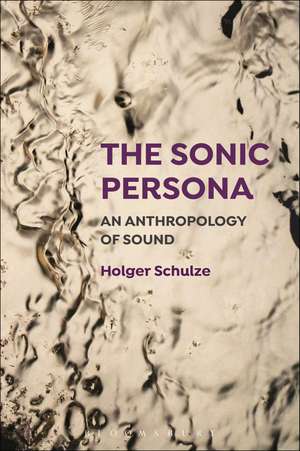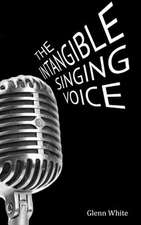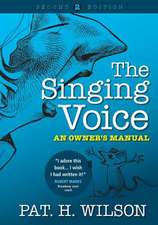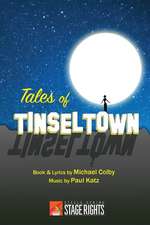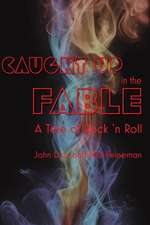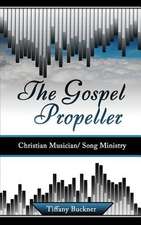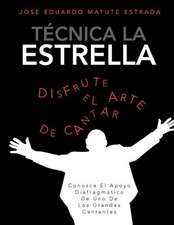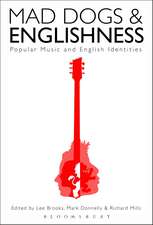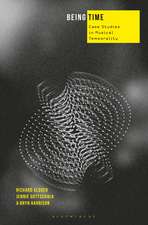The Sonic Persona: An Anthropology of Sound
Autor Professor Holger Schulzeen Limba Engleză Paperback – 21 feb 2018
| Toate formatele și edițiile | Preț | Express |
|---|---|---|
| Paperback (1) | 239.41 lei 6-8 săpt. | +65.77 lei 5-11 zile |
| Bloomsbury Publishing – 21 feb 2018 | 239.41 lei 6-8 săpt. | +65.77 lei 5-11 zile |
| Hardback (1) | 773.88 lei 6-8 săpt. | |
| Bloomsbury Publishing – 21 feb 2018 | 773.88 lei 6-8 săpt. |
Preț: 239.41 lei
Preț vechi: 273.64 lei
-13% Nou
Puncte Express: 359
Preț estimativ în valută:
45.82€ • 47.66$ • 37.82£
45.82€ • 47.66$ • 37.82£
Carte tipărită la comandă
Livrare economică 14-28 aprilie
Livrare express 08-14 martie pentru 75.76 lei
Preluare comenzi: 021 569.72.76
Specificații
ISBN-13: 9781501305450
ISBN-10: 150130545X
Pagini: 272
Dimensiuni: 152 x 229 x 27 mm
Greutate: 0.45 kg
Editura: Bloomsbury Publishing
Colecția Bloomsbury Academic
Locul publicării:New York, United States
ISBN-10: 150130545X
Pagini: 272
Dimensiuni: 152 x 229 x 27 mm
Greutate: 0.45 kg
Editura: Bloomsbury Publishing
Colecția Bloomsbury Academic
Locul publicării:New York, United States
Caracteristici
Offers a fresh and thought-provoking reading of classical texts and studies in the field of sound studies
Notă biografică
Holger Schulze is full professor in musicology at the University of Copenhagen and principal investigator at the Sound Studies Lab. He is the author of numerous volumes, articles, radio features on the field of Sound & Sensory Studies.
Cuprins
I. The Materialization of Sound: A Research History1. Quantifying Sound2. Materializing Listening 3. Corporealizing the SensesII. The Sonic Persona: An Anthropology of Sound4. In Auditory Dispositives5. The Sonic Persona 6. A Sensory CorpusIII. The Precision of Sensibility: A Political Critique7. The Precision of Sensibility 8. Resistance and Resonance 9. Generativity
Recenzii
[The Sonic Persona] is well-written and discusses important issues in a manner that is thoroughly thought-provoking ... [It] opens up so many new ways of dealing with sound and sensory experience, that I regularly almost yelled at the pages: "Yes! Tell me more!"
This is a wonderfully iconoclastic book, widely eclectic and learned. Written in the spirit of its sonic heirs, Kodwo Eshun and Michel Serres, it proffers an anthropology of sound like no other. It engages the reader in what Schulze poetically calls the art of receiving sound that is alert to the cultural, political, bodily and material nature of sonic practices. In doing so the book shifts and widens our understanding of the practices of sound and the art of writing about it.
The Sonic Persona is a groundbreaking work. While most works pay lip service to thinking about the senses and the sensorium, Schulze actually mobilises these ideas to challenge the ways we think and talk about sound. While we have had a generation of thought about the impossibility of objectivity and what a thoughtful, subjective scholarship might look like, The Sonic Persona enacts that critique and forges a path for genuinely scholarly, rigorous subjective analysis. Anyone who wants to study sound, music, audiovisuality, or multimodal arts practices will have to read this book. Perhaps most importantly, they'll want to.
By incorporating and reflecting on a wide range of philosophers, theorists and artists as well as anecdotal tales and first-hand descriptions of daily impressions, the book is both an example of the sonic person in action and the theoretical considerations behind it.
The Sonic Persona: An Anthropology of Sound is therefore a book that is not only to be read in the field of audio research and musicology but that is relevant to anyone with an interest in technology, in people and how they experience the world.
What do certain sounds and listening habits tell about their respective time, society, production conditions, politics? In his latest book [Holger Schulze] examines what constitutes or could constitute a ("our") Sonic Personality.
This is a wonderfully iconoclastic book, widely eclectic and learned. Written in the spirit of its sonic heirs, Kodwo Eshun and Michel Serres, it proffers an anthropology of sound like no other. It engages the reader in what Schulze poetically calls the art of receiving sound that is alert to the cultural, political, bodily and material nature of sonic practices. In doing so the book shifts and widens our understanding of the practices of sound and the art of writing about it.
The Sonic Persona is a groundbreaking work. While most works pay lip service to thinking about the senses and the sensorium, Schulze actually mobilises these ideas to challenge the ways we think and talk about sound. While we have had a generation of thought about the impossibility of objectivity and what a thoughtful, subjective scholarship might look like, The Sonic Persona enacts that critique and forges a path for genuinely scholarly, rigorous subjective analysis. Anyone who wants to study sound, music, audiovisuality, or multimodal arts practices will have to read this book. Perhaps most importantly, they'll want to.
By incorporating and reflecting on a wide range of philosophers, theorists and artists as well as anecdotal tales and first-hand descriptions of daily impressions, the book is both an example of the sonic person in action and the theoretical considerations behind it.
The Sonic Persona: An Anthropology of Sound is therefore a book that is not only to be read in the field of audio research and musicology but that is relevant to anyone with an interest in technology, in people and how they experience the world.
What do certain sounds and listening habits tell about their respective time, society, production conditions, politics? In his latest book [Holger Schulze] examines what constitutes or could constitute a ("our") Sonic Personality.
